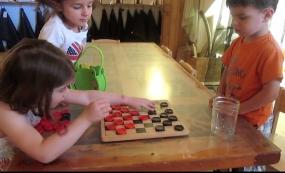Children Construct the Rules for Checkers

Golden and Emma are playing a game of checkers. Golden is teaching Emma how to play. Notice how patient and flexible he is as he tries to explain the rules and she doesn’t quite follow. Golden seems to demonstrate an understanding that Emma is making sense of the game in her own way. Notice the different ways he scaffolds her learning. For example, at 1:53, he deliberately moves his black chip next to her red chip in order to show her how to jump. We have added a complete transcript of their dialogue because it is so rich, but as we think about what Golden understands and what he might be missing, here a few examples to get you started on summarizing their "rules under construction." Golden knows that if color A jumps color B, the color B checker is removed. We wonder why he shows no disapproval when Emma adds checkers to the board. We suspect that taking an opponent’s checker is an end in itself rather than a way to ultimately win the game by eliminating all of your opponent’s checkers. Or maybe both children assume that the fun comes when you obtain a good number of the alternate color. At this young age game rules are often "things you do" instead of "things you do as a strategy to win." Such is the process by which children gradually construct higher order concepts from basic level moves. Watch the openness to rearranging checkers without treating these rearrangements as subject to the one-space-per-turn rule. Of course, the one-space-per-turn rule creates the challenge of checkers and makes strategic thinking more important. But to Golden and Emma this is a game of "acquiring" checkers by jumping, without bowing to other constraints the likes of which do not enter their theory about games. Watch the entire clip several times, and make a list of the rules the children know, the rules they do not use, and why you think the rules they do know are the appropriate first stages of the ultimate construction of the conventional set of rules we use in checkers. Which rules do you think would be the last ones invented? And think about the knowledge we gain about young children's thinking when we invite them to develop new rules gradually as they make sense of each new set of rules. This construction need not eliminate the role of the adult, but an observant adult will treat these early versions of the game with more wisdom and effectiveness if the adult understands such things as the difference between a move and a strategy, i.e. jumping a checker versus eliminating blacks to win. Length of video: 3 minutes 16 seconds Keywords: Fives, Children-object, Rules, Games, Peer Scaffolding, Checkers
